.
.
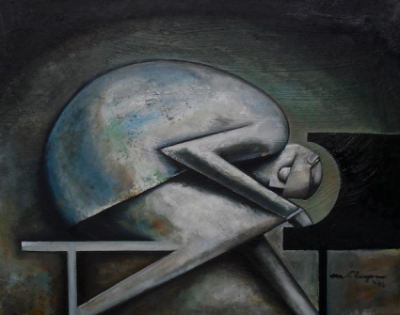
“Supposition” by Martel Chapman
.
“The world is never the same once a good poem has been added to it. A good poem helps to change the shape of the universe, helps to extend everyone’s knowledge of himself and the world around him.”
― Dylan Thomas
.
…..And, there are many good and often powerful poems within this collection, one that has the potential for changing the shape of a reader’s universe during an impossibly trying time, particularly if the reader has a love of music.
…..33 poets from all over the globe contribute 47 poems. Expect to read of love, loss, memoir, worship, freedom, heartbreak and hope – all collected here, in the heart of this unsettling spring.
…..I hope you enjoy…
…..Joe
.
.
(Featuring the art of Martel Chapman. All images within this collection are copyright Martel Chapman)
.
.
_____
.
.
Realizing Jazz
Sitting alone in the dark room, listening to the records of Miles,
I feel the lilac flow all around me with some philosophical noise,
I feel the flow and I trust it, I see now—
to find time—
we are joyfully realizing, that with this intangible second of finding,
a freedom is coming away from somewhere. This somewhere it’s not
a place but us, if we are free—we are at home.
.
by David Dephy
.
___
.
making music
like the first rays
…………………….of sun
or the mist
…………..at moonrise
………………………..like writing on water
sometimes
………….a slow dissipation
other times
………….an end
abrupt
.
by CJ Muchhala
.
___
.
It Was All Sax
arms of night enveloped me
pure sax singing in my ears
heart and caressing my mind
jazz all night long slow jazz
hot jazz dancing jazz and jazz
that slumbered that raised
and lowered blood pressure
love incarnate sweeping me
through long hours of darkness
all was sax sax sax and more sax
when day arrived and all grew still
and silent I rose to face a day
where roses grew and blossomed
everywhere I went and music
whispered at the back of my mind
.
by Michael L. Newell
.
___
.
Monk sweeps in the window
Monk sweeps in the window
between the daffodils and marigolds.
I taste the night air of Spring, and
it tastes like a cool breath of Hackensack.
Memories of one I lost and loved
strangle me gently, cutting off oxygen,
but here when the dead pool of silence
has been crushed by a straight,
no chaser Thelonious breeze,
the world outside the window
opens its arms to embrace me,
and its ugly beauty
is my salvation.
…………………………………………..appeared in Pangolin Review, March 8, 2019
.
by R. Bremner
.
___
.
Early Morning Solitude
Out of the summer air mellow notes
nudge loose the memory—a Bolivian flute
heard first on the trail ahead,
then in the distance and around a bend,
next afloat from a peak over our heads
as we hiked in the hills outside La Paz.
I look around.
A solitary figure sits in a chair in a shady spot
on the bluff, a clarinet at his lips. If he shifts
his eyes from the music stand
he can gaze upon glittering Lake Michigan.
He fits into the Milwaukee landscape
like that Incan flutist was part of the Andes.
He plays Ellington.
……………………………………appeared on Your Daily Poem, September 15, 2012
.
by Phyllis Wax
.
.
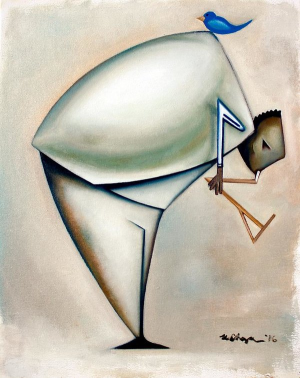
“Ornithologis Dualis” by Martel Chapman
.
.
For a Long Time We had No Money
Just rusty cars
a Pinto
a Volkswagen
a Gremlin that fell apart on New Year’s Eve
a tiny apartment
frozen pipes
bad jobs
a stocking cap for pajamas
gas stove for heat
all the warmongers were gone
so there was no need for poetry
just jazz music—
for that I was grateful
for that I fell in love a thousand times
.
by John Stupp
.
___
.
Take Five, Ludwig
Both my parents played piano
from a fake book, with different styles.
His was showy, arpeggiated.
Her melodic runs beguiled.
They’d sing in time. Mom’s voice? Just dreadful—
comedic, really—but Dad could croon,
of course Sinatra and all the standards.
On holidays, their favorite tunes
filled the house along with family,
our table laden, an Old World feast.
They’d joke in friendly competition
Who plays better? I at least
could never decide and I was thrilled
each Christmas Eve to turn the page:
he’d riff a flashy festive intro,
her Silent Night would set the stage
for after-dinner caroling.
A glass of sherry. A Yuletide kiss.
My Hanon exercising fingers
yearned to feel their harmonic bliss.
Dad’s cluster chords! Mom’s tones and colors!
How I wished I could improvise
while drilling scales, a keyboard scholar.
In my training they saw the rise
to baby-granding middle class.
And while my polished bench attests
to Bach and Beethoven, how I miss
my parents’ joyful jazziness.
.
by Felicia Chernesky
.
___
.
So What
His taxi cruised down
6th Avenue.
The city’s quixotic pace
in harmony with Miles Davis.
Through the window,
the neon extravaganza
of Times Square—
a one time haven
for junkies and pimps,
now infested with tourists
seeking cut-rate shows
and over-priced restaurants.
Like the CD track,
he’d think, “So What.”
As long as he got his fare,
he couldn’t care less.
After putting in eight hours,
he’d venture below 14th Street,
play his trumpet
at a local bar or café,
have a few beers
with other vagabonds,
talk trash and politics
at Washington Square Diner,
get laid at her place,
or smoke a joint.
He’d climb the stairs
to his cluttered apartment
shared with his cat, Miles,
wall-to-wall books,
and an LP jazz collection,
now considered vintage.
Sunday evenings,
he’d play his albums—
his trumpet would keep time
with six-legged squatters
simpatico to the beat.
In recent years,
the “ax fell” on the Village—
the invaders came, saw,
and invested.
Too many places,
now extinct—
others on the endangered list.
The life he knew was dying.
Cancer’s scythe
hacked his closest friends.
His health showed his age,
his work days grew shorter,
but he’s too poor to retire.
Evicted by his landlord,
his dive turned into
a millennial pad.
He’d take the A or C
to 168th Street,
climb the stairs
to his cluttered apartment
shared with his cat, Miles,
wall-to-wall books,
and an LP jazz collection,
now considered vintage.
On weekends,
he’d play his albums—
his trumpet would keep time
with six-legged squatters
simpatico to the beat.
Like the CD track,
he’d think, “So What.”
As long as he got his fare
and Social Security,
he couldn’t care less.
.
by Patricia Carragon
.
___
.
Pigeon Blues
I catch a glimpse of Mardi Gras
on the neck of a pigeon strutting past
and think of you.
Like you, the bird is
oblivious to me, also like you, probably.doesn’t
even know what the colors mean.
What has happened to New Orleans, I ask myself
every time I return. Truth is, it hasn’t been that often,
maybe not often enough. I still wonder. Just like I wonder…
I’m on the wrong side of 50, whatever.that means.
I don’t complain. I now see the horizon for what it really is.
How did I get here? Where am I going?
Jazz, joy. Blues, sad. It’s in the colors, I suppose.
The singers I used to see on stage are no longer here; one by one
they have moved on to their own big easy.
Some friends, as well. But the memories, like photos, are timeless.
I hum a tune from one of them, for all of them. Look out at the lake. Wonder;
Like New Orleans, I am sinking. I think of
Louis Armstrong and Congo Square, my mind still traveling
as I cross Sedgwick, sort of near where you used to live.
Meanwhile, a pigeon alights on a statue in Lincoln Park. Maybe it’s the same one.
I ask myself, how do they fly so far, walk so much?.I stop, look up,
step inside St. Michael’s. Kneeling. Thinking of you; I pray.
.
by Dan Franch
.
.
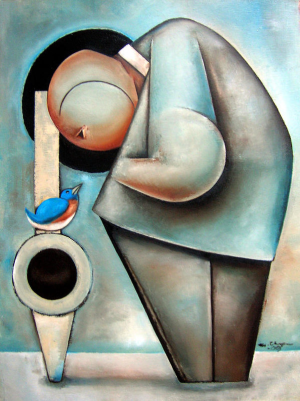
“Bird’s Reprieve” by Martel Chapman
.
.
What Is Pleasure?
What is pleasure?
Listening to hubby play a jazz improvisation?
Voicings vested in ten gifted fingers?
Revelling in chords unrivalled?
Food in mouth?
Massage’s touch?
Pleasure, what?
Delight?
Elation?
Gratification?
Simple fun?
Sheer diversion?
To take pleasure is to savour,
As a sample, for example,
Kent’s piano not just pleasure
But a treasure trove of silver;
Coin of worth, worth imitation.
What is pleasure, measure of…?
Anything that makes you smile,
Any force that keeps you mobile.
Any word what ends in -phile.
In opposition to the concept ‘down’,
Such as ‘downheartedness’,
Is feeling blessedness,
A boon your own.
A simple thought in bed last night,
Feeling warm and light,
A bed of roses, height of ease
No pain or seizure. Not inertia but a closure.
This is pleasure
Also.
.
by Arlene Corwin
.
___
.
Stan Getz
When the sax starts,
I forget the days in Denmark. They were
Never like the girl shaking her legs, her hair,
The shape of her neck.
They were like gin martinis near the pool,
Topless, dancing, shadows of the palm trees.
But here I am, in the studio. It’s too hot.
She reads Italian poetry and the smoke curls from her lips.
She speaks of her French lover
And a plane ride to Mazatlan.
She opens the coolness of the universe,
The essence of everything incredibly hip:
His goatee and your smile.
.
by David Sweet
.
___
.
My First Walkman
The first time I ever
stepped outside,
with plugs in both ears –
Miles Davis blew his horn
so sweet, so near,
as if his combo was in my head,
that warm morning in June,
and the traffic,
other folks out walking,
even their cutesy dogs,
were of no consequence.
Ten blocks was no longer
the distance between me and the corner store
but a glistening solo
or a strain of hard bop.
And, even when Miles reached for notes
far beyond the human playbook,
my footsteps kept a steady beat behind.
Paul Chambers on bass,
Bill Evans on piano,
Jimmy Cobb on drums,
Coltrane and Adderley
on howling sax –
those were my new street names.
The “Kind Of Blue” sextet
were set up right in my neighborhood.
I never knew I lived so close.
.
by John Grey
.
___
.
A Minor Happening
because the window was open
the sable wrapped texture & creamy tone
of a full album replay of “Joe’s Blues”
……………………..escaped
to blend directly with the Ether
perhaps that’s what prompted
an American Yellow Warbler
(Satophaga petechia)
to perch just beyond the climbing Pothos
(Epipremnum aureum)
to try to worm its way into
a Johnny Hodges & Lawrence Brown
………………………………………..duet turn
& being contrapuntally off-key
this sunlit tufted beguiler
garnered a certain tiny appeal
……………………but…
when it came
The End came quickly
startled off in the midst
of a Wild Bill Davis
B3 glissando
my guess… this Bird just couldn’t keep up
.
by Terrance Underwood
.
___
.
For The First Time
……………I Heard David Sanborn Play Jazz
…………………………………………………………..“For David Sanborn.”
.
………………..yes!
yeah man … yes it was
the very first time
I heard sanborn, and your band.
while we were both in high school,
you invited me,
to a packed nightclub to hear you.
the only word I could think of
when you took a first solo:
was “amazed.”
I have to say it over & over
I was so taken away
how well you
got around on your horn.
you played
a thousand times better
than any of us,
(no jive kidding here).
*****
man, how did you
get that distinctive sound?
from those unfurling notes
coming down through
the amber gold of your
selmer paris, alto saxophone.
I could almost
reach out …
and touch some sort of karate “ki”…
some unknown internal force
in and around you
and your playing.
as if I could
feel the edge …
of that selmer horn …
so alive.
*****
feel the actual groove
going with
the soul of your horn
(actually hear a sacred place
as you did speak) …
through your alto sax,
with your
so familiar defined sound.
it’s kind of
a universal thing:
you feel, that you are in there …
part of the jazz!
sanborn is playing for himself:
but we get it, he’s also playing
with a warmth of sounds
heart to heart
so just …for you … to hear.
.
………………………………………Published by WestWard Quarterly, Spring 2019
.
(Postscript: I met David Sanborn, in Kirkwood High school band, in St..Louis. At the time the high school did not have a jazz band or stage band. I played trumpet, and had my own dance band. I asked him to sit in, but he was always booked up. So, I had only heard him play concert band music, until I went to the nightclub, that first night).
.
by Alan Yount
.
___
.
Patrice Rushen
Reminds me of Hermione
From the Harry Potter
Books
If it was a crime for
Black women
To be smart
She’d rather go to
Jail
She plays keyboard
Like an octopus
Different planets
And galaxies explode
From her hands when
She plays
Between her and Herbie Hancock
They could cause a meltdown
In the solar system
Patrice plays jazz fusion
Like an aurora borealis
As if H.P. Lovecraft or Ray Bradbury
Composed the music
Patrice paints musical
Starstorms across the
Galaxy
.
by Erren Kelly
.
.
.
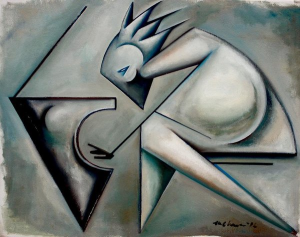
“Jazz Piano Modern” by Martel Chapman
.
.
The Genres Do Not Exclude Each Other
There would have not been bands
like The Jimi Hendrix Experience
or The Rolling Stones
without Mitch Mitchell
and Charlie Watts:
the jazz drummers.
Mr. Ennio Morricone
is viewed as a classical composer,
but he has crossed the genre barriers
so diligently
that when you listen to, for example,
Coincidenze
there’s no wonder why John Zorn
decided to make the record
The Big Gundown,
packed with
Morricone’s soundtrack tunes
and, for example, turning himself into
an un-avant-garde musician
while creating his instrumental version of
The Ballad of Hank McCain.
The genres do not exclude each other,
but too often people refuse to work with those
who do not fit their strict criteria of
what is pure and real music.
Yet, the most beautiful and extraordinary tunes
have been created by collaborating
over genre borders.
Just listen to
I’ve Been A Long Time Leavin’
by Roger Miller:
the drum and the bass are all you need
to validate my statement.
.
by Paula Puolakka
.
___
.
Conversations With Jimi Hendrix
I noticed you’re sleeping deeper,
more peacefully now, but I miss
you, man. My energy is just a bit
low today, so I’m practicing on
an old guitar tonight. Yeah, many
don’t even know I own one but
I got me a nice blue guitar at Sam
Ash that I named Jimi awhile back.
Focus, my friend, hope you’re
catching up with me. We always
have nice, quiet enjoyable times
together, don’t we? So I got this
natural swing in me, a gift from
Tequila and Meukow Cognac. But
there’s this one bottle of Cognac,
the one labeled Benedictine
Marques Deposees, too perfect to
open, know what I mean?
I’m feeling fine about having my
own space; like a rolling stone,
man, it gives me more freedom. I
was pleased to hear, changes ain’t
nothing to be concerned about, crazy
days move along to keep score. So I
guess you don’t know the latest
gossip, Jon and Kate got divorced.
Yeah, too bad huh? But hey, Lennon
had the same emotional release before
his beautiful relationship with Yoko.
I didn’t sleep at all last night, you
know how hard it is to maintain this
feeling of equal balance between the
two levels of my life now. Sometimes
the personal and the creative mesh and
that’s always cool. Hey Jimi! You
listening to me, Chief? The moon is
casting some strange light on the
windowpane. It’s always a good omen
when that happens. I guess it verifies
this music and me connect.
Hey Jimi, you think there will ever be
a time when the various facets of my life
will no longer be connected and balanced?
No? Me, either. So here I go, Jimi, you
still with me? Cool. Where are the words
in the shadow of deeds and hard work? In
initial dreams there is the sweetest of
songs. I sing along; in my head is truth
and a bar, and a tenement house, my brick
building on the back-drop of a purple haze,
this psychedelic paper representation,
imperfectly made, travels the wind in the
blindness of naïve skin that still
preaches, peace and love. I survey the
continual fall of man, the way people hate,
judge. I think it’s due to angry consciences
that sever happiness into fractions of
obligations and duties, some religious, some
political. But I pray that someday, someway,
they’ll tear their four walls down, and think
about the metaphor they’ve become.
Hey Jimi, how are you doing? I hope you know
you still shine with overflowing light, yeah,
it’s called fate. No man, it ain’t no curse.
You hold the key to grace divine, definitive;
you’re my black pearl of pride. How does it
feel? To be ripe and renown. I still mourn for
you, Jimi, and for the few who never saw the
flowing wonder of your ways and the beauty of
days. I could have been one of them if it
weren’t for you. And yeah man, I know you’re
all done with that shit; with the rising and
the falling.
.
by Theresa C. Gaynord
.
___
.
Kissed-Off
………………Lord knows I’m a voodoo chil’.
……………………………………..—Jimi Hendrix
Until that night a girl
had only kissed me. Not I
a girl. I was fifteen and for
over a year Jimi’d been telling me
he was a voodoo chil’, yeah,
and I wasn’t. No moon
had turned a fire red,
and not one mountain lion
had found me waitin’. Now
I was going with Sue,
at whose Midwest harvest party
I’d do the kissing. Nervous
and showing it, acting
distractedly, voice shaking,
our friends milling, I knew
it was a now-or-never situation,
even though I’d never ever
and didn’t really know. Giddy
and ridiculous, we slid into
the stairwell, out of range
of her parents in the kitchen,
the kids below: the outskirts
of our infinity… We made eyes.
We made small talk. But all I
could think about was making
my move. (If only I’d had a
Venus witch’s ring.) Then inching
my arm and small-talking her
a little more, I aimed my face
and kissed her! And oh, Lord,
the gypsy was right: amazing
and no big deal at once. So we
kissed again (Lord knows I
felt no pain) and for three months
flew on as make-out friends until
she dropped me for my best friend
at her party for my sixteen-and-
been-kissed birthday. And I fell
downrightdea-ea-ead.
…………………………………………………—first published in The Wayward Sword
.
by D.R. James
.
___
.
Rethinking Jerry Garcia
………………………for Jerry, in memoriam, and for Susan, in contrition
There is not one lick from the Grateful Dead
that remains inside my head. Jerry’s neckties
are the things that sing to me. I just hear them
differently from those forgotten songs and all
the shapeless endless sprawling concert jams
which have now gone missing from the archive,
wherein is housed a vast collection—an arena
full of records, both LP and CD. I blame the cult
of Jerry and sundry other Dead-Heads for their theft.
Jesus might forgive them, but he is not the one
who wants to play them now, and though I am
just another over-the-hill-hippy-freak-yellow-dog-
democrat, still— Goddamn you shaggy potheads,
always looking for some shit that never existed
anyway. I have a right to sulk. I do not work here
anymore. I’ve lost my bully pulpit, therefore,
I have done the next best thing, and culled out
my Jerry ties, six of them, which once were seven,
from the hundred that I own but never wear, having
left those in the dark air of lost time, alongside Mrs.
Marcos’s eight hundred eighty eight handbags, her
three thousand pairs of shoes. All of that is old news,
as is Garcia’s own demise, August 9, 1995, eight days
after his birthday. Anyway, here they are, all laid out
atop the ancient black and coffin style wood case that
holds my banjo. I catalog them here in random order:
1.Lunch (Collection Seventeen) olive, brown, maroon;
leafy shapes and serpentine tan squiggles, their borders
faintly hatch marked in gray-white, no food of any sort
in sight.
2.Banyan Trees (Collection Fourteen).small blue-gray
flowers against large blooms in burgundy, no tree.
3.South of the Border.(Collection Fifty Seven) dark unbroken
Brown with lighter brown and gold strokes down the length.
Off-white strips cross these diagonally, but at the bottom
of the tie, turn horizontal. No chicanos or any human
figures, and no Trump Wall as a gift from Mexico.
4.Humming Bird Study (Collection Nineteen) tilted letter
m’s-possibly wings, vague checkerboard effect (pea soup
and russet) and some white things, maybe feathers.
5.Emerald City (Collection Fifty-Three) no greens, nor any
munchkins, phony wizard, ruby slippers, but only lines that
undulate and intertwine, autumnal hues.
6.Still Life (Collection Thirty-Nine, Limited Edition) a strip
of gaudy red, stemmed and scattered three leaf clusters
done in gold with light blue striping, suggesting constant
tumbling motion.
Absent his guitar, that’s the show, necessarily hung in this place
on my banjo, and at times I start to see here what he saw. And as for
the 7th one,.I gave that necktie to my son: bees, gold and black-quite
literal for once,.the tie that Susan gave to me,.but not subsequently,
her forgiveness, although the gift remains within the family. It was
the only tie he ever wanted, I think the only one he ever wore till he
got married. From here,.I’m going to the grocery store, to buy some
Ben and Jerry’s, the flavor that they call Cherry Garcia, and after all
these lovely twanging, goofy years, will share some of it with Susan,
no quid pro quo, no absolution, no amnesty requested or expected
by a ridiculous and tie-dyed child of a long-gone-revolution, but so
grateful to be here and that Jerry, contrary to the rumor, is not dead.
.
by Joel Glickman
.
.
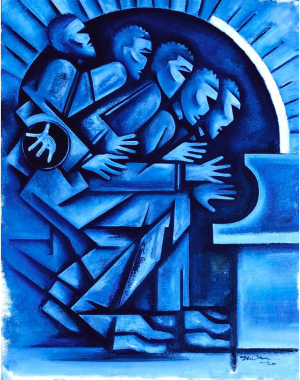
“Blues/Ascent” by Martel Chapman
.
.
Blues Bag
blues going
to resurrection
reconstruction
acres of faces
burdened souls
draped in delta
calloused hands
sacrificing
laboring sweat
never drowning out
culture of hearts
while lifting up
sorrow songs
angels with voices
messages of gold
singing
“there’s something
greater
than what I got
here”
.
by Roger Singer
.
___
.
The Meaning of the Blues
Only in Pittsburgh
do the dead walk backwards
on their way to work every morning
like Miles
who used to play
with his back to the audience
and cuss so only God could hear
that’s just the meaning of the blues he used to say
you can’t use plain English
.
by John Stupp
.
___
.
Little Girl Blue
sitting under the big top
she finds circus life
more sane than her life at
home
chaos is better than order
and pain is diamonds
for her
let ella soothe her soul
as the blue jean diva
sashays
to her solo serenade
let the road be her jesus
as not even the dirt
can hide her
smile
let her tattoos be her scriptures
as she smiles,.as ella’s song
lifts her soul
and baptizes her in
healing….
.
by Erren Kelly
.
___
.
If Only I Had Been His Cornet
It was always kept at his side, no matter
where he went, even when we went to T.J.
in search of a chess set, said he never knew
who might want him to play on a given day
It meant more to him than I, who watched
with envy as his fingers moved the valves
of his cornet, music consuming the air
the same way he consumed me
Unlike his cornet, I was dispensable
breaking my heart into a thousand
chords, losing my melody
because he upped and left me
He was never my man, he belonged to
his music and his horn, I wasn’t in his plans
He didn’t love me the way I loved him
If only I could have been his cornet
.
by Aurora M. Lewis
.
___
.
Joyfully Blue
In the dark blue
deepening to black
of early evening,
I, silent and still, sit
listening to a gently rising
orchestra of sound:
a bird rhythmically sounding notes
which call to mind
Milt Jackson’s mallets slow dancing
up and down a vibraphone, a chorale
of insects gradually growing louder, voices
of lads playing soccer in the distance
down a curving dirt road, men
and women talking, laughing, flirting,
and welcoming the deep peace of dusk’s
warm and comforting waters;
I lean back and my eyes rest upon the rising
of a silvery moon, and I drift away.
.
……………………………………………………….Kigali, Rwanda, September 2011
.
by Michael L. Newell
.
.
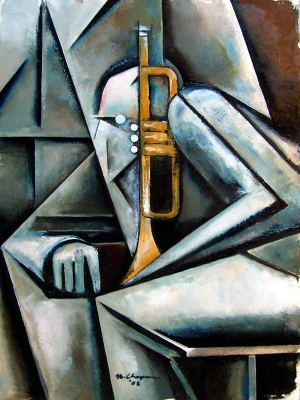
“Masqualero” by Martel Chapman
.
.
Chet Baker [The Route]
Jolting along 18, over potholes and bumps,
the dashboard MP3 flashes “The Route.”
An unexpected moment of brilliance —
Leroy Vinegar’s “toe-tapper” bass
introduces five minutes
of musical wizardry,
light and uncluttered.
Pete Jolly enters,
his beat a string
of delicate jewels,
a joyful tintinnabulation.
Baker slips in,
clean and pure.
If I could,
I’d kick back,
tap my foot
like Vinegar’s
opening.
L.A. Jazz — too cool!
Man, them Cats
are just havin’
one good time.
Smoooooooth.
.
by Russell Dupont
.
___
.
Wycliffe Gordon Concert, Feb 2020
Stanford University’s Bing Auditorium
probably cost more than the entire
Hurricane Katrina bailout.
We went to see to the southern jazzman
backed up by Stanford Jazz Ensemble:
just kids, really. And most of them
destined to become Google engineers
or lawyers. But I had to quit judging
their politely rich audience
once they began to applaud:
they were all in.
The kids in the band grooved
with all the sadness and swagger
the music demanded. They were
older than their parents.
With Wycliffe wailing
and sweating up a storm
I got it: no one
didn’t deserve to be here,
was just playing a part.
We’d come to have our minds blown
by that astounding horn man.
.
by Charles Albert
.
___
.
Blue Rondo a la Turk
On a…..crowded…..street in…..Istanbul
………….walking…..to a…..music station…..full
of lo-……cal mu-…..sicians…..waiting there
………….Bru heard…..crazy…..music…..in the air
then he…..got it…..straight up…..in his head
………….and at…..the place…..all the…..players said
that 9/…..8 is…..great but…..nothing new
………….it’s to…..us just…..like the…..blues to you.
………….Swing low, sweet saxophone
………………………on a street in Old Stamboul;
………….swing low, sweet saxophone,
………………………comin’ for to carry me home.
………….I looked over Bosporus and who did I see,
………………………comin’ for to carry me home?
………….It was brothers Dave, Joe, and Eugene,
………………………with Desmond on the saxophone.
………….Swing low, sweet saxophone,
………………………on a street in Old Stamboul;
………….swing low, sweet saxophone,
………………………comin’ for to carry me home.
Joe and…..Eugene…..lay the…..bottom down
…………..they both…..really…..start to…..go to town;
Bru and…..Desmond…..chasing…..music bliss,
…………..Mozart…..never…..had a…..day like this!
.
by Craig Smith
.
___
.
Thinking of Chet Baker
I never slept
with a trumpet under my pillow
like Chet
an old sweatshirt sometimes
never a trumpet
guitar strings once
Galli
the ones made in Italy
I forgot I was playing on our bed
until the sun
pulled the night off
to borrow some money
and ask
what can I save you from?
.
by John Stupp
.
.
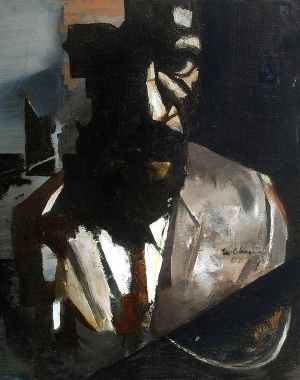
“Monk” by Martel Chapman
.
.
Walk the Beat Poet
art on the wall
rained on
though still survives
through winter
into spring
a life image
a testament
onto shoulders
walking short streets
banging out words
turning them into
rough ploughshares
turning up
turning over
the blood of soil
with stained shirts
and hats
working long
with calloused hands
.
by Roger Singer
.
___
.
He is yet with us…
When it was
…………………………….Time
When the city lights burned
…………………………………….just brightly enough
…………..to see
…………………………….The Truth
When the world needed a reminder
…………………………………………..not to take itself
Too seriously
…………..(yet seriously enough . . . )
Lawrence Ferlinghetti
…………………………….dropped a bomb
…………………………………….in our upturned faces
Giving the Six Gallery
…………………………….a place to breathe
…………..and grow
Giving a unified Voice
…………..to a Generation
…………………………….of word lovers
…………..of hate haters
…………………………….of beat makers
…………..Troubled Souls
…………………………….who weren’t afraid
……………………………………………………………….of anything
…………..(anyway not Coit Tower)
Certainly not
…………..The Censors
………definitely not
…………..The
…………………House
……………………………..Un-American
……………………………………………………….Activities
…………………………………………………………………………Committee
These Troubled Souls only feared
………(silence)
Lawrence Ferlinghetti said
…………..“Come to me
And I will make you
…………………………………….poor
………………………….vilified
…………….persecuted
And Prosecuted”
………………………….profane fishers of
Kindred Souls
…………..with voices howling in the
……………………..Wilderness
………………………………………….seeking
Those
…………….so badly needing Kinship
Those
…………….who
…………………….living in Hedgeville
…………………….would Hear and say
…………………….“There are Others!”
Those
…………….who
…………………….would Read and say
…………………………….“Behold!”
Those
…………………….who could then
………………..give themselves over to
…………………..their own private
……………………………..Coney
……………………………..Island
……………………………..Of
……………………………..The
……………………………..Mind
And be
………………..Saved
,
by Bob Walters
.
___
.
Theme for the Eulipions
(after Rahsaan Roland Kirk)
Duty free gifts for travelers
tickets to new worlds
You lip eons
moistening the fragile reed
keeping the abyss at bay
children of Euterpe
the happy lip people
you lip ions
electricity leaps lip to lip
to reed
your lip on my ear
your ions are gluons
eyes glued to your lips
unable to glance away
from your fullness
your drops keep falling on my head
on my eyes
on my ears
you
lippy on my eyes
lipping through the eons like so many octaves
you lip eons
of music from before
eons of music to come
.
by Michael Vander Does
.
___
.
Ben Webster’s “Come Sunday”
from solemn beginnings
out of The Good Book of Duke
it’s heard being played
with languid determination
……………as a soothing sermon
a secular hymn
a reed & groove construction
meant for an afternoon
………………………………..celebration
to the shade of ancient trees
……………short sleeve warmth
………………………………..the laze
tall barefoot cool ones
……………………half napping or
half drifting among temporal clouds
deep in drowsy tonal dominion
absorbing comfort’s pervious blessings
& from another venue
putting I suspect
even Miles
smiles ahead
.
by Terrance Underwood
.
___
.
Visit
House on the hill. Car parks
along the curb, two doors slam,
porch screen swings. “This is the one
I told you about,” the trumpet player
to the old man.
Ziz ziz ziz! whistles through the gap
in the old man’s teeth. His head comes close,
face cracking, eyes staring.
He raises a finger – sh! Up!
Into the house. Stocking feet slide
down the narrow hall, hand slaps
hard on a book, on the table top. Gently
he eases a record onto the ancient turntable.
Invisible sticks in his hands crash
upon invisible drums. He winks.
Hands the sticks to the guest, says,
“Now you play.”
.
by K. Roberts
.
.
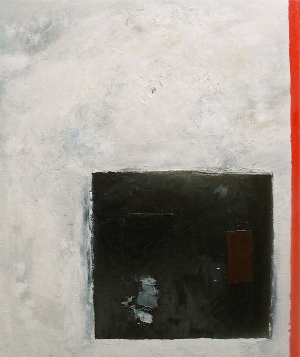
“Implication” by Martel Chapman
.
.
River
I was listening Miles Davis when my father died
And I felt emptiness. I felt emptiness for the second time.
The first time I felt it in my childhood, when I saw the drying
River and was afraid. “Don’t be afraid,” said my father.
“The river begins at source, everything begins
at source and returns to source.”
He was a rower. I saw him in a boat many times,
he was a champion. “Someday you will see as the river
surrenders itself to the sea,” he said. “Try to guess what
is inside me that moves inside you as well?”
“Love,” I said.
“Exactly,” he said.
I thought he took all the rivers away out of earth with
his boat and left only silent emptiness all around me.
“Love is the source,” I said to my dead daddy and have heard
the voice of him deep inside my heart: “That’s why we vanish,
this happens every single time without any exception,
we are the rivers.”
“And the rowers,” I thought and let him go.
.
by David Dephy
.
___
.
I Stand Over Jaco’s Grave
Well, maestro, this is the last stop
To puzzle you out through the ostinato of the years.
You have a sweet spot in the shade of a big tree.
Outside, I swear, is a street called
The Boulevard of Champions. That makes me smile.
I should keep it brief, right? You once told a grandstanding guitarist
That his speedy trail of notes that didn’t resolve
Was like jerking off without coming. Yikes!
I’ve come to say you don’t puzzle me any more.
I accept the obstinate teeter-totter. You said it many times,
This is just who I am. The genius, the madness,
Were verse and chorus in you. Not separate songs.
No one except you could ever accept the descent.
Now I accept it. It was just who you were.
There are two great lessons to remember
In this silent field, your last hospital or prison:
To show up for the gig in spite of every fresh hell,
And to remember the melody first of all.
I’d bust you out of here, if I could,
Break the spell of your final hang.
I’m a little like you, not a lot like you.
But I remember two grand things,
The madness and the genius of being around.
And insofar as I can play at all,
I incline to the beautiful, as you did.
What’s this? You’ve written out a part for me,
Some improvs I can use to skip
The tangled middle part of “Continuum.”
Yes! I see! Play the notes that have come before,
They must be in the key, or the mode,
Or the hieroglyphics of the song.
Just vary the order, allude to the melody.
The melody is freaking beautiful.
Happiness is just one riff away; no, it’s here.
That hangnail I had doesn’t bother me anymore.
Rest easy, maestro. The rest is up to us.
No one is likely to forget your Everest,
Your Marianas. Your Six Flags!
The Jaco rollercoaster
Still shakes us to the marrow,
But we get off alive.
Who loves you? You always used to say,
Mimicking the bald cop with the lollipop.
Who loves you?
I love you.
And look, it isn’t true I didn’t finish.
There’s the little trail of my tears.
.
by Mark Fogarty
.
___
.
An Evening Journey
In early evening hush,
rain’s soft susurration,
with a quiet elegance
one might find in a Bill Evans
or Lester Young or Miles Davis
solo, flows through open windows,
carries me from contemplation
into deep sleep where I float
downhill riding creek’s current
through forests, past boulders,
into meadows where voices
of children echo, and distant past
welcomes me without question,
as certain songs or tunes
stir the heart whenever they
are sung or played,
such as “God Bless the Child,”
“Summertime,” or “Stella by Starlight,”
and I drift through waves of music,
and the world laps against
my mind as it dozes, just as I drift
in and out of consciousness
when the rain carries me into memory,
then back to the edges of today.
.
by Michael L. Newell
.
.
.
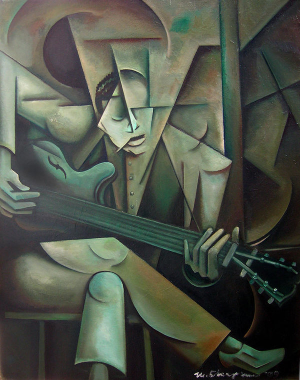
“Grant’s Greens” by Martel Chapman
.
.
In Venice
In Venice I saw them
dancing across the spires of sunset
into
….a twilight of gray luster lagoons
A couple with
Fred Astaire in his steps
Ginger Rogers
dipping
and backbends
Twirling and whirling when
wayward winds broke into twilight
And still they danced above the
dark waters of Othello
shimmering with halos
………of Venice chandeliers
whispering through the windows
Moon puddle waters surrounded them
Currents reflected with palaces and cathedrals
Sprays and mist kissed our faces
Gondoliers plied the waters
Wakes and swishes
Splashes of a boating song
A lone gent in suit and tie
Sat on a water-logged balcony
Dining above the fluid poem of Venice
wrinkling the waters
And a trumpet bleated in a dark channel
Remembering all
through the fog of time
Shrouds of Venice
rising from the lagoons
Doves with iridescent wings
Ghosts of mist
And palaces swimming through
the scrolls of currents
From yesterday
………they are yet dancing in my mind
.
by Susandale
.
___
.
It’s All in the Game
Her intimacy traveled
down his spine,
but his tension blocked her hand.
He jolted out of bed,
yelled at her to stop.
Without saying a word,
she sat up on her side of the bed.
She heard the bathroom door slam
and the squealing cries
of the old faucet.
Maybe this time,
the water might drown his sorrow.
He had his ritual
and she had hers.
The bedroom was quiet,
except for the Baby Ben.
It heard and saw everything,
but the clock ticked on,
oblivious to the human drama.
The miscarried child,
the miscarried marriage.
From across the yard,
a radio played “It’s All in the Game.”
Too many tears have been falling,
their hearts have lost
their wings,
and this game was over.
Without saying a word,
she left the bed
and closed the window.
.
by Patricia Carragon
.
___
.
Papa Meets Miles in Spain:
…………………..A Dangerous Summer in the Sketches of Spain
Passing by the misty mountains of Spain
to under the tender arms of chestnut trees
Papa is off to Fiesta
Meanwhile, Miles wanders through
the shadows and lights of Madrid’s
lush gardens
A long, slow pass with the cape,
a cuadrilla, is accompanied by
Miles’ melancholy memories
of yesterday’s bewitching love
Miles’ song hangs in the air
until the Pan Piper announces the encierro
In Pamplona, Papa waits on his balcony
to watch the bulls charge forward
While within the cathedrals and missions of Spain
vigil lights flicker
And the triumphant trumpeter
rounds the bend to a full house
where
he clicks and clacks flamboyant flamencos
before he
tiptoes around the bend
to fall into the long silence
of a muleto
folded and doubled over
for another day’s Fiesta
.
by Susandale
.
___
.
Caffeinated Blues
He stalks a lady nightly
in the landscape of her dreams,
this stranger. Mornings
they eat at the Corner Cafe–
the lady with coiled hair, him with
the coal black eyes–elbows in proximity
a dance of sorts between padded stools
that never
ever touch.
Doralee the waitress
pours her a cuppa joe,
ignores the silence played out
every morning at six-fifteen between
those two
although he slices daily
through the yellow yellow
centers of his over-easy eggs.
Doralee leans with folded arms
against the jukebox, does a slow pelvic
tilt to the blues harp, waiting
for Sonny Boy to come striding through
the papered, fly-specked wall
wailing ‘bout love gone bad.
The dance of the elbows
winds down, the harp fades
to a lonesome-sounding moan,
and a moan
sidles out the door with him,
this stranger who stalks a lady
between padded stools
that never
ever touch.
.
by CJ Muchhala
.
___
.
alto sax
A sprinkled wail of cool blue notes,
the wistful howl of urban Man,
his statement of the garden dream
before metropolis began.
A husky call that gathers up
the clustered dreams that lurk and seem
to talk of night and plaintive eyes,
cosmopolis and soul and dream
and plaintive eyes: that haunting thought
which husky whispers represent:
stained Eve of dream’s Bohemia
least real and final innocent.
……………………………….First published in.Lines Review (Edinburgh), 1978
.
by Robert Nisbet
.
.
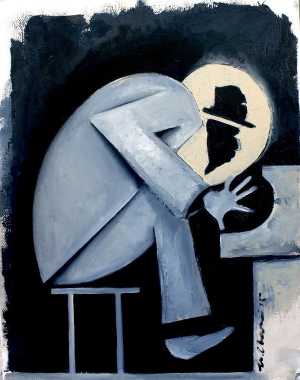
“Crepuscule” by Martel Chapman
.
.
The blue hour
Night gives Day the slip; wearing her blue slip,
the sky turns blue after the deed is done:
the Sun disappears, leaving behind
a trail of lithium-causing light,
gold mixed with tangerine and pink
as the Sun sinks away West/South once again—
Night gets to work, but before putting on
her black dress specked with stars,
before making her date with Mr. Moon,
she stays in her blue slip,
watching the Sun’s deconstruction,
drinking her Happy Hour drink in her favorite chair,
and relaxing as the humans rush home from work.
.
by Carrie Magness Radna
.
___
.
Night Train
………………………For Oscar Peterson, And All Of His Piano Jazz
we keep thinking
………….of the train
……………………on that album cover.
it’s the blue shades of jazz
………….and the train engine in the picture,
and oscar’s sound
……………………that keeps it speeding all along.
… at night:
………….oscar on piano:
…………………… dit … da dit …da dit
just like
………….rail tracks clacking.
in a dream, years ago
………….the same train still rolls up
……………………to the station.
we both met then, and both of us said
………….“it will
……………………all work out all right.”
oscar’s still playing
………….that song over & over
……………………now recorded
………………………………in my memory.
recently,
………….now in another dream
……………………the train still rolls up,
among the hissing of steam
………….and some other train sounds.
there’s still some voice that says:
“the train
………….may not come
……………………when you want it to …”
“but it’s always
………….right on time.”
.
by Alan Yount
.
___
.
Blue Shadows in the Street
When I hear Miles Davis,
……………master of the Harmon mute
………………………..and the melancholy note
play down cool
……………kind of blue
………………………..sketches of Spain
……………………………………..dear old Stockholm
……………time after time
………………………..blue in green
……………………………………..after a heavy rain
I am
……………1 lone figure
………………………..in blue raincoat
……………………………………..walking down a night alley
……………1 a.m.
………………………..casting blue shadows
……………………………………..across the puddles.
.
by Craig Smith
.
___
.
Caprice
Prolonged night, my song:
further, swan-necked —
black, sibilant cry;
thought, its clarinet,
spread like dew —
gathered, moist, cool:
one loves truly —
then the eye, opal,
appears open
in sight of the moon.
.
by John Jack.Jackie (Edward) Cooper
.
___
.
Epitaph
Sirens wail
horns blowing smoke
scat graffiti jammin’
with metro and Bird
where I wait for the Pentagon 10A
to the crystal city
above the aisle
a poem
about Mingus
and jazz demons in the night
.
by Edward Sheehy
.
___
.
And Then There Were None
Old man on a balcony
rocked his grief through
long afternoon, listened
to Sketches of Spain
hour upon hour, smoked
a pipe redolent of cloves,
an empty rocker next
to his draped with flowery
cushions, rocking from time
to time when wind chimed in.
He hummed trumpet solos
in broken raspy voice, recited lines
from King Lear with quiet passion
of Miles Davis or Bill Evans
at their melancholy best,
“O, thou’lt come no more.
Never never never never never.”
He fell asleep while the music
played on, caught in a loop.
Miles welcomed onset of dusk.
Night spread its inevitable blanket.
.
by Michael L. Newell
.
.
_____
.
.

The artist Martel Chapman writes about his work:
.
The re-issue of Blue Train came out in 1997, and that cover by Francis Wolf drew me in immediately. Coltrane in deep thought, with his saxophone resting… I needed to know about this! I replayed that intro twenty times in that short drive to work that afternoon, and that sound has been vibrating in my bones ever since.
I have been investigating the music and the musicians ever since, my early paintings depicted them straight; in a sort of realistic state, as to share with those that didn’t know of the artistry and genius behind the sounds. I was letting those that didn’t know that the music is important!
As I had gone on, after reading anything I could on the artists, I felt I needed to do them justice by exploring my own individuality, my own voice, as to see if I had learned anything from the hours and hours of listening and reading of them. Twenty-two years since Blue Train was re-issued, while toiling away in various warehouse jobs, I’m still learning and giving back to the music that is most important to me.
.
Click here to visit his website
.
.
___
.
.
photo by Donna Termini

David Dephy is a Georgian/American award-winning poet. The winner of the 2019 Spillwords Poetry Award, the finalist of the Adelaide Literary Awards 2019 for the category of Best Poem. He was named as A Literature Luminary by Bowery Poetry and The Incomparable Poet by Statorec. His works have been published and anthologized in USA, UK and all over the world by many literary magazines, journals and publishing houses. He lives in New York.
.
.
___
.
.
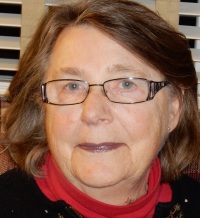
CJ Muchhala has absolutely no musical ability but a great deal of appreciation for and love of jazz and blues. She does, however, try to make music with words which have found their way into a number of journals, anthologies, and art/poetry exhibits.
.
.
___
.
.
Michael L. Newell lives on the Florida coast.
.
.
___
.
.
.
.

.
R. Bremner has been writing since the 1960’s. He appeared in 1979’s first issue of Passaic Review, along with Allen Ginsberg and Rich Quatrone. International Poetry Review, Oleander Review, Paterson Literary Review, Red Wheelbarrow, and.Shot Glass Journal.are a few of the journals he has been in. Ron has won Honorable Mention in the Allen Ginsberg Awards, and has published six print books, including.Ektomorphic(Presa Press), and thirteen eBooks.
.
.
___
.
.

Phyllis Wax writes in Milwaukee on a bluff overlooking Lake Michigan. Her poetry has appeared previously in Jerry Jazz Musician and in many other journals and anthologies, online and in print. A Best of the Net and Pushcart Prize nominee, she has read in coffee houses, bars, libraries and on the radio. Her work has been exhibited with art quilts and weavings as part of poet/fiber artist collaborations. She can be reached via email at [email protected].
.
.
___
.
.
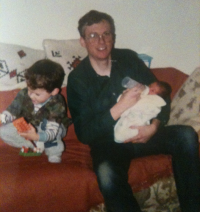
John Stupp’s third poetry collection Pawleys Island was published in 2017. His manuscript Summer Job won the 2017 Cathy Smith Bowers Poetry Prize and was published in August 2018. A chapbook entitled When Billy Conn Fought Fritzie Zivic was published by Red Flag Poetry in January, 2020. (From 1975-1985 he worked professionally as a mediocre jazz guitarist). He lives near Pittsburgh, Pennsylvania and can be reached via email at [email protected].
.
.
___
.
.

Felicia Sanzari Chernesky is a longtime editor, slowly publishing poet, and author of six picture books, including.From Apple Trees to Cider, Please!.and.The Boy Who Said Nonsense.(Albert Whitman). In 2018 she left the masthead of an academic quarterly to work with people who want to share their stories, ideas, and poems in print. Her poem, “Mother Tongue,” received an honorable mention in the 2020 Allen Ginsberg Poetry Award. Felicia lives with her family in Flemington, New Jersey. Find her online, with links to recent publications, at. www.feliciachernesky.com
.
.
___
.
.

.
Patricia.Carragon’s recent publications include.A Gathering of the Tribes, Bear Creek Haiku,.First Literary Review-East, Live Mag!, Muddy River Poetry Review, Narrative Northeast, Panoplyzine,.and.Stardust Haiku..She has forthcoming work from.EOAGH, Nixes Mate,.and.The Paterson Review.. Her.latest books from Poets Wear Prada are.Meowku.and.The Cupcake Chronicles,.and.Innocence.from Finishing Line Press. Her first novel,.Angel Fire,.is forthcoming from Alien Buddha Press.
.
.
___
.
.

.
Dan Franch, who grew up in the Chicagoland area, currently lives in Estonia. Living a life full of random experiences and adventures and people, he currently owns his own English & coaching company.
.
.
___
.
.
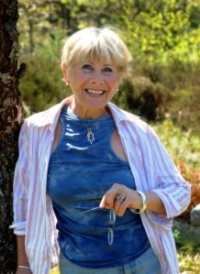
Arlene Corwin…Brooklyn born. Age 85. Harpist, pianist, singer. High School of Music & Art. Hofstra Univ. BA. 2 films (lead in one, composer in the other — see IMDb) original lead in “The Nervous Set, introducing “Spring Can Really Hang You Up the Most”. 19 published poetry books, yogin since the age of 20-something. Lives in Sweden. Jazz musician forever. Mother owned jazz club, The Turf with Slim Gaillard in the 50’s, Hempstead, Long Island. (See.Arlene Corwin. Poetry.com .for longer version.). See Youtube for Arlene and some good tunes.
.
.
___
.
.

David Sweet is a poet, author, entrepreneur, executive coach, and runaholic. His poetry includes the books, Pop Rocks and Split Infinity Forward. Born and raised in Denver, Colorado, he has called Tokyo, Japan home for the last 20 years where lives with his wife, sons, fish, and running shoes. He can be found www.drdavidsweet.com and can be reached via email at [email protected]
.
___
.
.
John.Grey.is an Australian poet, US resident. Recently published in Sin Fronteras, Dalhousie Review and Qwerty with work upcoming in Plainsongs, Willard and Maple and Connecticut River Review.
.
.
___
.
.
Terrance Underwood is a retired Rolls-Royce Service Engineer, veteran, College Grad (B.A. History) who has been listening to recorded jazz music since he was 5-6 yrs old. One of his first memories is listening to a 78 version of “Cherokee” by Charlie Barnett.
.
.
___
.
.
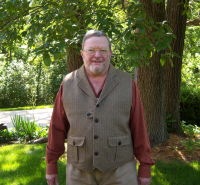
Alan Yount, 72, has published poetry for over 50 years. His poems have appeared in WestWard Quarterly (featured poet for summer, 2018). Big Scream, Spring: the Journal of the E.E. Cummings Society, and Waterways.
He has been in three anthologies: Passionate Hearts, Sunflowers.and Locomotives: Songs for Allen Ginsburg. Alan was one of 31 poets, along with Gary Snyder and Lawrence Ferlinghetti. Also Chrysalis Reader.
Alan plays trumpet and has led his own dance band.
.
.
___
.
.
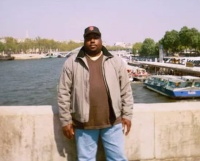
Erren Kelly is a two-time Pushcart nominated poet from Boston whose work has appeared in 300 publications (print and online), including Hiram Poetry Review, Mudfish, Poetry Magazine, Ceremony, Cacti Fur, Bitterzoet, Cactus Heart, Similar Peaks, Gloom Cupboard, .and .Poetry Salzburg.
.
.
___
.
.
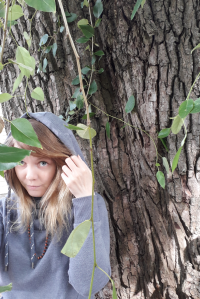
Paula.Puolakka (1982) is a Beat poet, writer, and MA (History of Science and Ideas) who has landed first and second in (or gained honor from) the writing contests and challenges held in the USA, Israel, Finland, and South Africa. In 2020, Puolakka’s work has been distributed by Rattle (Rattlecast #25,) Rural Oklahoma Museum of Poetry, Poetry Potion,.The Burgundy Zine,.kitaab, Fewer Than 500,.Thimble, Nine Muses Poetry, Spillwords Press, and Brave & Reckless.
.
.
___
.
.

Theresa C. Gaynord writes about matters of self-inflection and personal experiences, matters of an out-of body, out-of-mind state, as well as subjects of an idyllic, pagan nature and the occult. She also writes horror, as well as concrete gritty and realistic dramas. She is said to be a witch and a poet, (within the horror writing community) and has been published in a number of magazines throughout the years.
.
.
___
.
.

D.R. James lives in the woods near Saugatuck, Michigan. His most recent of nine collections are .Flip Requiem.(Dos Madres Press, 2020), .Surreal Expulsion.(The Poetry Box, 2019), and .If god were gentle. (Dos Madres Press, 2017), .and his micro-chapbook .All Her Jazz. is printable-for-folding at the Origami Poems Project.
https://www.amazon.com/author/drjamesauthorpage
He can be reached by email at [email protected]
.
.
___
.
.
 .
.
Joel Glickman taught music including jazz history and the jazz band at Northland College, Ashland Wisconsin, from 1974 until retirement in 2017, where he has resumed teaching about jazz again, part time. He has written and published poetry over a wide range of subjects. Primarily a classical clarinetist and folk singer-song writer and banjo player, his jazz and saxophone skills lag behind these. He resides in Ashland with wife Susan and their Bichon, Madeline.
He can be reached via email at [email protected]
.
.
___
.
.

Dr. Roger Singer was in private practice for 38 years in upstate New York. He has four children, Abigail, Caleb, Andrew and Philip and seven grandchildren. Dr. Singer has served on multiple committees for the American Chiropractic Association, lecturing at colleges in the United States, Canada and Australia, and has authored over fifty articles for his profession and served as a medical technician during the Vietnam era.
Dr. Singer is the Poet Laureate of Old Lyme, Connecticut. He has had over 1,070 poems published on the Internet, magazines and in books and is a 2017 Pushcart Prize Award Nominee. He is also the President of the Shoreline Chapter of the Connecticut Poetry Society.
.
.
___
.
.

.
Aurora M. Lewis.is a retiree having worked in finance for 40 years. In her fifties, she received a Certificate in Creative Writing-General Studies, with Honors from UCLA. Aurora’s recent poems, short stories, and nonfiction have been accepted by The Literary Hatchet, Jerry Jazz Musician, The Blue Nib, Trembling in Fear, Jitter Press, Scary Snippets, Copperfield Review to name only a few.
.
.
___
.
.

Russell Dupont is an artist and an author whose artwork is included in a number of public and private collections. He has published two novels, King & Train and Waiting for the Turk; two books of poetry; and two non-fiction chapbooks. His essay, “The Corner,” is included in the anthology Streets of Echoes. His work has been published in various newspapers and literary magazines. He was the founder & publisher of the literary magazine,.the albatross.
Visit his website by clicking here
.
.
___
.
.

Charles Joseph Albert writes poetry and fiction in San Jose, California, where he also performs with the South Bay Bones. His work has appeared recently in Spectrum, In Parentheses, and California Quarterly, and a new collection, Confession to the Cockroaches & Other Poems is available on Amazon.com.
.
.
___
.
.
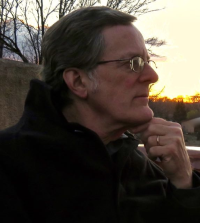
Craig Smith is the author of Sing My Whole Life Long: Jenny Vincent’s Life in Folk Music and Activism. He is currently at work on a book about the song “Joe Hill.”
.
.
___
.
.
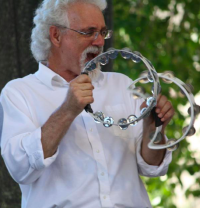
Bob.Walters.grew up in the bayou country of East Texas. After graduating from West Virginia University, he has spent the last few decades teaching Literature, Writing, and Creative Writing in Asheville, NC, where life is good and music is wonderful. He also plays drums in a blues and soul band, writes fiction and poetry, and paints to calm a restless spirit. He is married to his favorite person, and they have three large sons.
.
.
___
.
.

Jazz.Poet filmmaker Michael Vander Does is from Columbus, Ohio. He performs with The Jazz Poetry Ensemble (poetry/trombone/leader) (www.makejazznotwar.org). His poetry is informed by avant-garde jazz.
.
.
___
.
.
K Roberts is a professional non-fiction writer and also publishes poetry.
Contact the writer
.
.
___
.
.
Mark Fogarty is a poet, musician and journalist. He curates The Jaco Pastorius Gig List on Facebook
.
.
___
.
.

.
Susandale’s poems and fiction are on WestWard Quarterly, Mad Swirl, Penman Review, The Voices Project, and Jerry Jazz Musician. In 2007, she won the grand prize for poetry from Oneswan. The Spaces Among Spaces from languageandculture.org has been on the Internet. Bending the Spaces of Time from Barometric Pressure is on the Internet now.
.
.
___
.
.
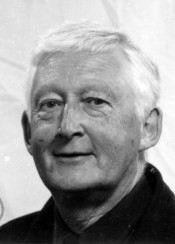 Robert Nisbet is a Welsh poet and sometime creative writing tutor at Trinity College, Carmarthen, living just a few miles down the coast from Dylan Thomas’s Boathouse. He has published widely and in roughly equal measures in Britain and the USA. He is a Pushcart Prize nominee for 2020.
Robert Nisbet is a Welsh poet and sometime creative writing tutor at Trinity College, Carmarthen, living just a few miles down the coast from Dylan Thomas’s Boathouse. He has published widely and in roughly equal measures in Britain and the USA. He is a Pushcart Prize nominee for 2020.
You can contact him via email at [email protected]
.
.
___
.
.

Carrie Magness Radna is an audiovisual cataloger at New York Public Library, a choral singer and a poet who loves traveling. Her poems have previously appeared in.The Oracular Tree, Mediterranean Poetry, Muddy River Poetry Review, Poetry Super Highway, Walt’s Corner,.Polarity eMagazine, The Poetic Bond.and.First Literary Review-East. Her first poetry collection,.Hurricanes never apologize (Luchador Press) was published in December 2019. Born in Norman, Oklahoma, she lives with her husband in Manhattan.
.
.
___
.
.

John Jack Jackie (Edward) Cooper is the creator of These Are Aphorithms (http://aphorithms.blogspot.com), author of Ten (Poets Wear Prada, 2012), Ten … More (Poets Wear Prada, 2016), and translator of Wax Women, with French texts of the original poems by Jean-Pierre Lemesle (International Art Office: Paris, 1985). His work has appeared widely, in print and online, most recently in The Opiate, Rat’s Ass Review, Jerry Jazz Musician, and Paris Lit Up 8. A graduate of the University of Pennsylvania, he is editor and co-publisher of Poets Wear Prada, a small press based in Hoboken, New Jersey. He lives in Paris.
You can contact him via email at [email protected]
.
.
___
.
.

Short stories by Edward Sheehy have appeared in The Write Launch, an online literary magazine (2019) and in Lake Street Stories, published by Flexible Press (2018). Dog Ear Publishing released his novel, Cade’s Rebellion, in 2018. Forthcoming in 2020, a short story in Frontier Tales (online). He lives on the West Bank of the Mississippi River.
.
.
___
.
.
Click here to read the Winter, 2020 Poetry Collection
Click here to read the Fall, 2019 Poetry Collection
.
Click here to learn how to submit your work for consideration
.
.
.






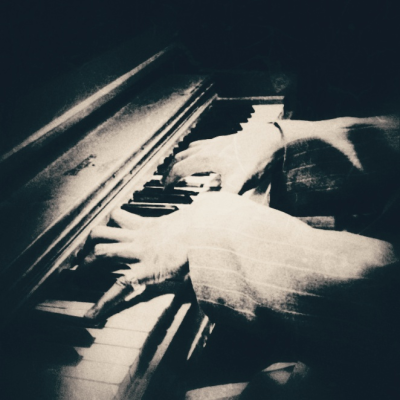


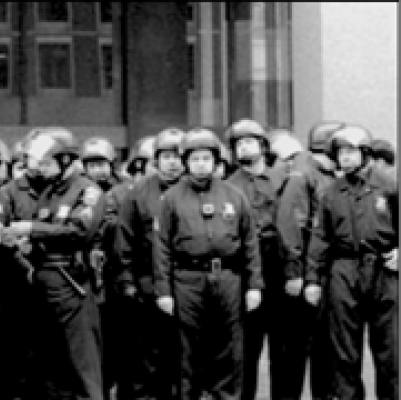










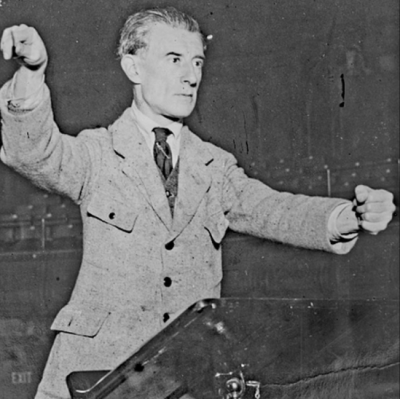

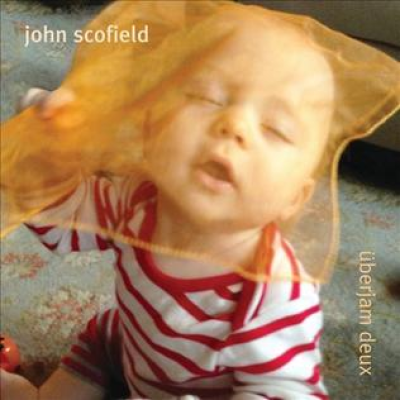






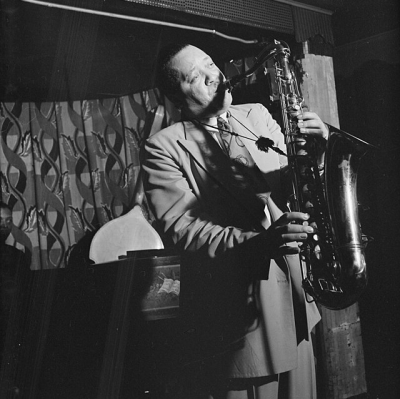













This is a GORGEOUS issue, and I’m so proud to be a part of it! What talent is around! Somebody tell me how to hawk it! Mr Maita’s magazine deserves to be spread and read – rather read and spread!
Off to read about Berlin!
Arlene Corwin
The collection is electric. Mr. Maita has managed to organize something, which transmits certain energy. Is it Mr. Maita’s energy, or is the same vibe present in all the poems? Fabulous job, sir. You are a treasure.
In the same way, as in fall and winter, I will give some feedback to a few randomly chosen poems. (Maybe somebody else can continue.)
The Poems:
Monk sweeps in the window by R. Bremner
The conflict between the outside world and the inner realm of the narrator is obvious. The poem is almost too short, or is the “sudden-death” vibe meant to be as “mean” as it is? I like the expression “Thelonious breeze.”
My First Walkman by John Grey
The poem reflects the way how music is everywhere nowadays. When you’re plugged-in, you’re also estranged from your friends, family, and the world. Yet, the musicians have to listen to their surroundings to create music. The music-lovers are, in a way, trapped inside somebody else’s world 24/7 instead of living a life of their own.
Walk the Beat Poet by Roger Singer
The poem is a “slender backbone of a Beat poet.” We are merely whispers compared to the hard-working men and women who are the models of our pieces. How can we handle this fact? Bob Dylan’s “Buckets of Rain” holds the answer: “You do what you must do, and ya do it well.” Sometimes all a person can do is write a poem and sell it the best way he or she can.
He is yet with us… by Bob Walters
My favorite piece: Mr. Ferlinghetti mentioned, and the form of the poem is a token of appreciation to him. Lovely.
That was it.
I wish you the best day of your life.
With best regards,
Paula
Thank you Joseph Maita for another banner issue of talent. What a nice surprise to be published on my birthday.
Cheers,
Patricia
Hello, again.
I need to share an old poem of mine, which first appeared on The Ekphrastic Review on 1/3/2020. It was a response to the painting “Gogol’s Dream” by Viktor Gontarov. For some reason, the picture reminded me of “1983… (A Merman I Should Turn to Be)” by The Jimi Hendrix Experience and also, “Trampled Underfoot” by Led Zeppelin. In this collection, we had a few Jimi Hendrix poems! By sharing this old poem, I want to show that good music elevates your mind and brain, and it makes you find Love and fellowship from places, which to some could appear as something to stay away from.
The Jimi Hendrix Experience is an interesting group since Mitch Mitchell was the “jazz dynamo” of the band, and for the listeners, the glue between the worlds of rock and jazz. Also, before jazz (and blues,) there was classical music. If we’re talking about Led Zeppelin, then it’s obvious that Jimmy Page was for the listeners the glue between the worlds of classical music and rock, blues & jazz. So, many times, genres do not exclude each other. Even when you’re observing an old painting, you can find yourself thinking about, for example, modern rock tunes. The mental and emotional bonds of this world are very complexed.
Have a beautiful day!
BR,
Paula
Trampled Underfoot
Nobody’s talking about love,
and when a gentleman falls for a true maiden,
the three lady friends of his turn into the neighing
horses with the minds of mules:
“Trampled underfoot! Trampled underfoot!”
In the hand of the fair maiden is a white lotus
which represents her heart:
she’s the enlightenment, and she is free from jealousy.
Her world is the ocean, free from barriers and walls,
and she can’t stop talking about love.
“Trampled underfoot, yes,” the man says,
and his hat is the first thing to fall off
before he becomes a merman:
“Trampled underfoot I shall be if it gives me the freedom
from neighing, and I don’t have to stop talking about love.”